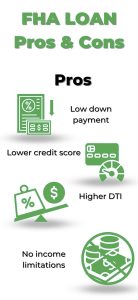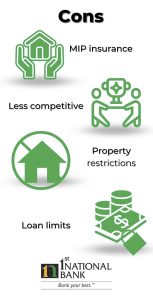FHA Loans
 Federal Housing Administration FHA loans and what it means for you.
Federal Housing Administration FHA loans and what it means for you.
What are FHA loans?
FHA loans were created by the federal government to help middle to low-income families lacking savings and credit qualify for a loan. Since these loans are guaranteed by the federal government, there is less risk to the lender if the borrower defaults on their loan.
How FHA loans different from a conventional loan?
- Conventional loans aren’t backed by anyone other than the lender. Because of this, there are more strict qualifications for a conventional loan since the lender is assuming all of the risk.
- FHA loans are ideal for someone that:
- Doesn’t have much set aside for a down payment
- High debt-to-income (DTI) ratio
- If you have a lower credit score
- You would need a strong credit score to qualify for those advantages on a conventional loan.

FHA loans: Pros & Cons
There are pros and cons to both types of loans including but not limited to mortgage insurance requirements, loan limits, and property appraisal requirements. So it is important that you know your financial standing and prioritize your homebuying decisions.
Pros:
- Low down payment – FHA loans allow for as little as 3.50% down payment and you still receive competitive rates
- Lower credit score – Conventional loans require you to have a strong credit score. FHA loans can be closed with a score as low as 500
- Higher DTI – FHA loans afford more lenient DTI for borrowers. Borrowers with a 43% DTI or lower can qualify.
- No income limitations – There is a myth that FHA loans are for limited income or first-time homebuyers. False. There is no max income limit that would prohibit you from funding.
Cons:
- Mandatory MIP payments – To mitigate risk to lenders, you will have to pay Mortgage Insurance Premiums (MIP) for either 11 years or the life of your loan depending on your down payment amount.

- Less competitive – FHA loans could make the sellers hesitant to accept your offer compared to a higher cash offer.
- Property restrictions – There are strict criteria for properties funded by an FHA loan. It is important to know if your property qualifies before making an offer.
- Loan limits – FHA loans often have a lower loan limit so you might not be able to afford a more expensive house. That’s fine because you have less to pay back.
How do I qualify for an FHA loan?
Even though it is easier to qualify for an FHA loan you still need to meet the minimum requirements. The loans are federally backed, but the funding comes from an FHA-approved lender (like 1st National Bank) and the lender might have different qualifications.
FHA loan minimum requirements:
- Minumum 500 credit score
- DTI at or below 43%
- 2-years proof of steady employment
- 3.5% – 10% down payment
- Property qualifies for FHA loan
- Below FHA max loan amount ($1,149,825 as of 2024)
How do I get approved?
- Decide if an FHA loan is the best fit for you. Can you qualify for a conventional loan? Is your credit score, DTI, or savings preventing you from qualifying? If you aren’t sure, contact one of our mortgage bankers today to discuss your options.
- Call 1st National Bank to start your pre-approval application.
- Get pre-approved to see how much you can borrow for your new home.
- Submit your FHA loan application when you have found a qualifying property.
Apply for your FHA loans online today!
Conventional loans aren’t as flexible as you would like, you have trouble qualifying for a conventional loan, or need some help finding the right loan for you? Contact us today to get started or you can apply now online with the button below.
Still have questions? Have us contact you.
Try our free Mortgage Calculators
See how much house you can afford!
Adjustable Rate MortgageThis calculator helps you to determine what your adjustable mortgage payments will be. | ARM vs. Fixed RateUse this calculator to compare a fixed rate mortgage to two types of ARMs, a Fully Amortizing ARM and an Interest Only ARM. | Bi-Weekly PaymentsUsing bi-weekly payments can accelerate your mortgage payoff and save you thousands in interest. Use this calculator to compare a typical monthly payment schedule to an accelerated bi-weekly payment. | Maximum MortgageUse this calculator to determine your maximum mortgage and how different interest rates affect your how much you can borrow. |
Mortgage APRUse this calculator to find the APR on your mortgage. | 15 vs. 30 YearUse this calculator to compare these two mortgage terms, and let us help you decide which term is better for you. | Early PayoffUse this calculator to determine your monthly payment and amortization schedule. | Mortgage PointsSave thousands of dollars in interest by increasing your monthly mortgage payment. |
Mortgage QualifierCan you buy your dream home? Find out just how much you can afford. | Refinance BreakdownShould you refinance your mortgage? Use this calculator to determine when you will breakeven. | Refinance Interest SavingsUse this calculator to see how much interest you can save by refinancing your mortgage! | Rent vs. BuyAre you better off buying your home, or should you continue to rent? |
Information and interactive calculators are made available to you as self-help tools for your independent use and are not intended to provide investment advice. We cannot and do not guarantee their applicability or accuracy in regards to your individual circumstances. All examples are hypothetical and are for illustrative purposes. We encourage you to seek personalized advice from qualified professionals regarding all personal finance issues.



